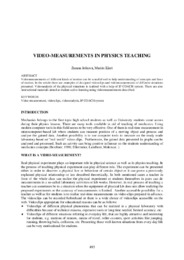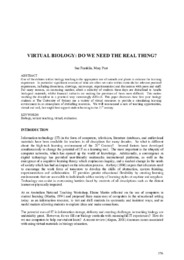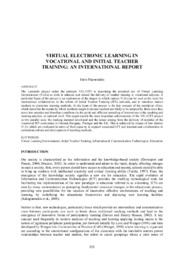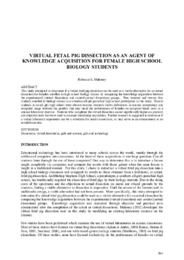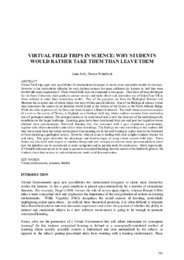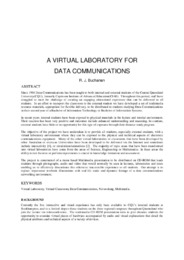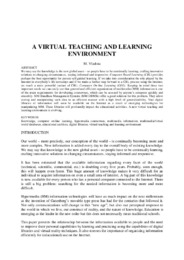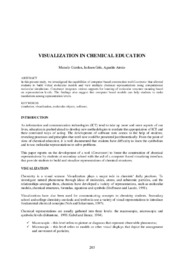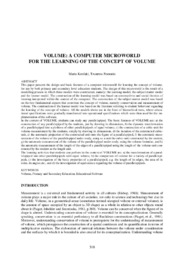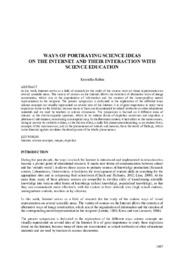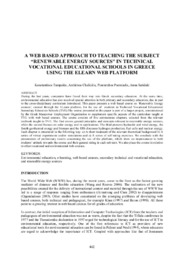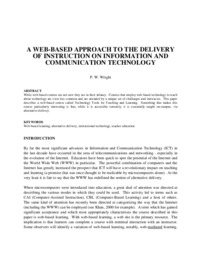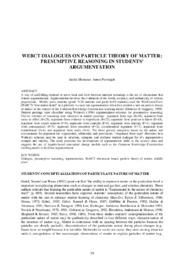Browsing Computer Based Learning in Science (CBLIS) by Title
Now showing items 311-330 of 337
-
Verification of practical skills in an e-course
(2010)eLearning has become quite popular among students, educational institutions and official authorities. Many institutions have decided to employ this study tool in their programs. The eLearning environment enables knowledge ... -
Video-measurements in physics teaching
(University of Zilina, 2005)Videomeasurements of different kinds of motion can be a useful tool to help understanding of concepts and laws of motion. In the article there are examples of designed videoclips and videomeasurements of different situations ... -
Virtual biology: do we need the real thing?
(Department of Educational Sciences, University of Cyprus, 2003)One of the debates within biology teaching is the appropriate use of animals and plants to enhance the learning experience. In particular significant amounts of time are often set aside within curricula for relevant practical ... -
Virtual electronic learning in Vocational and initial teacher Training: an international report
(University of Cyprus, 2007)The Leonardo project under the acronym VELVITT is examining the potential use of Virtual Learning Environments (VLEs) as tools to enhance and extend the delivery of teacher training in vocational subjects. A particular ... -
Virtual fetal pig dissection as an agent of Knowledge acquisition for female high school Biology students
(Department of Educational Sciences, University of Cyprus, 2003)This study attempted to determine if a virtual fetal pig dissection can be used as a viable alternative for an actual dissection for females enrolled in high school biology classes by comparing the knowledge acquisition ... -
Virtual field trips in science: why students Would rather take them than leave them
(Department of Educational Sciences, University of Cyprus, 2003)Virtual Field trips open new possibilities for instructional designers to create more interactive worlds for learners. However is the interactivity afforded by such desktop systems for users sufficient for learners to feel ... -
A virtual laboratory for data communications
(Pedagogical Faculty of University of Ostrava, 2001)University(CQU), formerly Capricorn Institute of Advanced Education(CIAE). Throughout this period, staff have struggled to meet the challenge of creating an engaging educational experience that can be delivered to all students. ... -
Virtual optical illusions for creative learning
(Department of Educational Sciences, University of Cyprus, 2003)An amazing “rotating ring” optical illusion was studied in the frames of the students’ educational computer-based research work. Virtual images of differently shaped moving objects were simulated in QBasic 71, MS Visual ... -
A virtual teaching and learning Environment
(Pedagogical Faculty of University of Ostrava, 2001)We may say the knowledge is the new global asset – so people have to be continually learning, crafting innovative solutions to changing circumstances, staying informed and responsive. Computer Based Learning (CBL) ... -
Visualization in chemical education
(University of Zilina, 2005)In this present study, we investigated the capabilities of computer-based construction tool Construtor that allowed students to build virtual molecular models and view multiple chemical representations using computational ... -
Visualization of quantum phenomena
(University of Cyprus, 2007)Many abstract phenomena are, by their nature, "unseeable". What then does it mean to visualize quantum phenomena such as Compton Scattering, Alpha and Beta Decay, or collisional de-excitation? Perhaps more importantly, how ... -
Volume: a computer microworld For the learning of the concept of volume
(University of Zilina, 2005)This paper presents the design and basic features of a computer microworld for learning the concept of volume, for use by both primary and secondary level education students. The design of this microworld is the result of ... -
Ways of portraying science ideas on the internet and their interaction with science education
(Department of Educational Sciences, University of Cyprus, 2003)In this work, Internet serves as a field of research for the study of the various ways of visual representation on several scientific areas. The variety of sources on the Internet allows the detection of alternative ways ... -
A web based approach to teaching the subject “renewable energy sources” in technical Vocational educational schools in greece Using the elearn web platform
(University of Cyprus, 2007)During the last years, computers have found their way into Greek secondary education. At the same time, environmental education has also received special attention in both primary and secondary education, due in part to ... -
Web environment for learning, experimenting and knowledge evaluation in regression
(University of Zilina, 2005)Regression is a powerful instrument of statistics, largely used for solving various problems in economics, agriculture, sociology, psychology, biology, educational sciences etc. Also, in the last years, many modern ... -
A web-based approach to the delivery of instruction on information and Communication technology
(Pedagogical Faculty of University of Ostrava, 2001)While web-based courses are not new they are in their infancy. Courses that employ web-based technology to teach about technology are even less common and are attended by a unique set of challenges and intricacies. This ... -
Web-based environment for design, development and learn with performance-centered Educational systems
(Department of Educational Sciences, University of Cyprus, 2003)Web-based performance-centred educational system is an integrated environment, which is available via Internet and is structured to provide individualized online access to the full range of information, guidance, advice, ... -
Webcoct – a tool for producing web-based courses
(Department of Educational Sciences, University of Cyprus, 2003)The aim of the paper is to describe the project WeBCoCT (Web Based Courses Creating Tools) intended to become a learning environment to help academic teachers to introduce web-based courses. WeBCoCT has as its main goal ... -
WebCT dialogues on particle theory of matter: presumptive reasoning in students’ argumentation
(Department of Educational Sciences, University of Cyprus, 2003)A way of scaffolding students to move back and forth between multiple meanings is the use of discussions that feature argumentation. Argumentation involves the evaluation of the worth, accuracy, and authenticity of various ... -
Webquest – activity for internet based learning
(University of Zilina, 2005)WebQuest is one of the effective methods of using ICT tools in the process of learning. It is an activity dedicated to making significant use of WWW resources. WebQuest idea derives from Bernie Dodgie, of San Diego State ...

